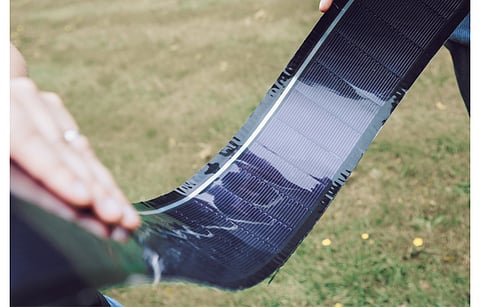

Belgian PV technology research institute imec has announced a new manufacturing spin-off called EnFoil, with its research partner Hasselt University (UHasselt), to produce thin-film, flexible solar panels based on copper-indium-gallium and selenium (CIGS) solar cells for integrative use in various applications.
Energy Enabling Foil, or EnFoil, intends to roll out PV modules in customized sizes and shapes at a large scale. These can either be directly installed or further integrated into end products, using patented technologies and processes developed by its parents.
Professor Bart Vermang of imo-imomec, the imec associate lab at UHasselt, claims the solar cells achieve 'almost the same efficiency as standard panels', but with larger applicability.
Currently, the company is targeting the logistics sector to help them integrate these modules on roofs and sidewalls of trucks to power their sensors, and track & trace systems. With abundant sunlight, these panels could also charge the vehicle's battery.
Until now, the team explains, consumers had to pick from pre-defined flat products for their vehicles or buildings, and manage integration on their own.
"This mainly limited the technology to exclusive construction projects, or as an expensive opt-ins for cars. With Enfoil, we aim to change this," said CTO of EnFoil, Marc Meuris. "We intend to make custom solar foils in any size and shape at a large scale ("mass-customization")."
EnFoil guarantees the feasibility and integration of final products that could also be installed on swimming pool covers or roof tiles.
The project partners have secured €150,000 grant from the European Research Council (ERC) for the EnFoil project. They claim the product is ready and waiting to be introduced to the market for which EnFoil is in discussions with industry players.
The Belgian institute had previously introduced Soltech NV, headed by Bas van de Kreeke, as its spin-off to produce customized BIPV panels (see Soltech Planning Customized BIPV Panels In Belgium Fab).
